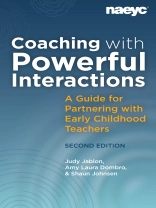From the authors of the bestselling book Powerful Interactions comes a guide crafted especially for coaches and all professionals supporting the work of early childhood teachers.
When the quality of interactions improves, relationships become deeper and stronger, which in turn leads to more effective learning and growth. Taking the three-step Powerful Interactions framework—originally created to enhance the interactions between children and their teachers—this resource applies it to the interactions between teachers and coaches.
This new edition offers
You can set in motion ripples of positive change that extend to teachers and, ultimately, to young children and their families.
Table of Content
< b>List of Video Clips
About the Authors
Acknowledgments
Preface
Welcome
What Is Coaching?
What Is Coaching with Powerful Interactions?
Your Coaching Stance
It’s All About the Children
It’s Simple and Affordable, and Applies to All of Us
Coaching Is About Relationships
Thoughts About Coaching with Powerful Interactions
Chapter 1: An Introduction to Powerful Interactions Between Coach and Teacher
What Is a Powerful Interaction Between a Coach and Teacher?
Step One: Be Present to Coach
Being Present Leads to More Effective Coaching
Step Two: Connecting as a Coach
Connecting and Building Trusting Relationships Lead to More Effective Coaching
Step Three: Coaching to Extend Learning
Extending Learning and Continuing to Learn Lead to More Effective Coaching
The Three Steps: A Cumulative Effect
Chapter 2: The Five Principles for Coaching with Powerful Interactions
Principle One: A Strengths-Based Perspective Searches for and Highlights Competence
A Strengths-Based Perspective Makes You a More Effective Coach
A Strengths-Based Perspective in Practice
Principle Two: Articulation Encourages Repetition of an Action with Greater Intentionality
Using Articulation to Promote Intentionality Makes You a More Effective Coach
Articulation in Practice
Principle Three: Individualizing Supports the Development of Respectful, Trusting Relationships Needed for Learning
Individualizing Makes You a More Effective Coach
Individualizing in Practice
Principle Four: A Mutual Learning Partnership Promotes Shared Responsibility and Accountability
Building a Mutual Learning Partnership Makes You a More Effective Coach
A Mutual Learning Partnership in Practice
Principle Five: Modeling Matters—What You Say and Do Influences All Outcomes
Modeling Makes You a More Effective as a Coach
Modeling in Practice
Chapter 3: The Three Steps of Coaching with Powerful Interactions
Step One: Be Present to Coach
Do a Quick Me Check
Step Two: Connecting as a Coach
Connect Strategy One: Be Trustworthy
Connect Strategy Two: Listen to Learn
Connect Strategy Three: Communicate to Form Partnerships
Step Three: Coaching to Extend Learning
Extend Learning Strategy One: Focus on Goals You Set Together
Extend Learning Strategy Two: Notice Moments of Effectiveness
Extend Learning Strategy Three: Use Prompts and Questions to Think Together
Extend Learning Strategy Four: Document Plans and Progress Together
Closing Thoughts
Appendix A: Coaching with Powerful Interactions Steps and Strategies at a Glance
Appendix B: A Powerful Interactions Classroom Observation and Feedback Conversation
Appendix C: Rehearsing a Coaching Conversation
Appendix D: Planning for the Feedback Conversation
References
Index
About the author
Judy Jablon is the founder and executive director of Leading for Children, a national nonprofit with the mission of providing the best possible early learning experiences for young children while creating environments where educators thrive. Through her writing, video production, and professional development experiences, Judy encourages early childhood educators to draw on their own wisdom to have more meaningful interactions and opportunities for learning.
Amy Laura Dombro is an early childhood educator and documentarian who captures stories of change initiatives with the goal of supporting people who do their best work on behalf of children and families. Amy’s work serves as a mirror for busy educators and organizations, providing them with the opportunity to see and build upon what works, think creatively to overcome challenges, track progress, and plan next steps on their path forward.
Shaun Johnsen is a television professional with more than 25 years of experience in the field of education. He is a co-owner of Murray Hill Studios, a New York City-based video production studio, and uses his unique experiences as a producer, photographer, videographer, editor, and musician to create rich, meaningful content. Shaun has collaborated with Judy, Amy, and others to create videos that invite educators to view their own practice, identify moments of effectiveness, analyze and reinforce these moments, and strategize about how to apply these practices more extensively with greater intention.












